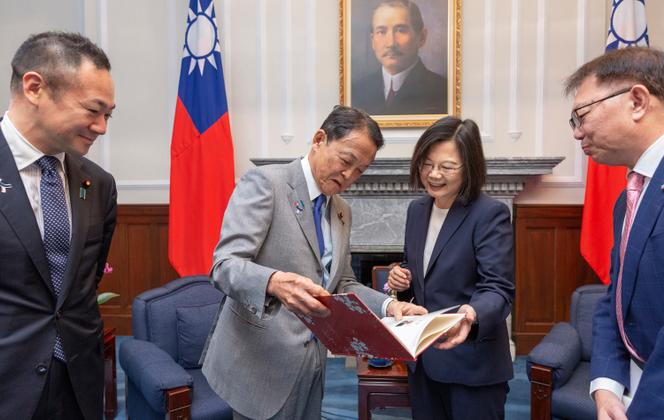


The new "national security" strategy announced by Japan in December 2022, designed to double military spending and strengthen its alliance with the United States over the next five years, has so far generated little debate. Welcomed by a public concerned about global tensions, it represents a quantitative and qualitative leap in the direction of policies initiated in 2012 but is not unanimously approved by international relations experts, who warn against an excessive focus on the Chinese threat.
This strategy was recently reiterated by former Japanese Prime Minister Taro Aso, currently vice-president of Tokyo's ruling Liberal Democratic Party, during a visit to Taiwan. Japan and its allies must "wake up" and "show their firm determination to fight back," declared this influential right-wing figure on Tuesday, August 8 in Taipei. According to him, "deterrence only has an impact if we make it clear to our adversary that we are prepared to use it."
But there are dissenting voices challenging this vision. In a 50-page study published at the end of July, "Asia's Future at a Crossroads: A Japanese Strategy for Peace and Sustainable Prosperity," a dozen researchers, led by Keio University honorary professor Yoshihide Soeya and George Washington University professor Mike Mochizuki, call on Tokyo to adopt a more realistic policy. This approach, whose authors can hardly be suspected of belonging to an anti-American left, contrasts with calls from the right to strengthen the Western camp's deterrent capacity against China.
"Japan should not misapply the lessons of the Ukraine war to Asia," the authors of the study note from the outset. Instead of blindly following the United States as it overreacts to the Chinese "threat," Japan must become the linchpin of a middle-power coalition in the region, and seek autonomous diplomacy to mitigate the rivalry between Beijing and Washington. By continuing down the path of confrontation, the region risks a tragedy in which Japan will be one of the first victims.
While approving of the development of the Archipelago's defensive capabilities, the authors believe that the disparity between the new defensive paradigm and Japan's actual capabilities in five years' time will prevent it from defending itself alone. "The United States will fill this gap, and Japan will be a little more dependent on them," said Soeya in an interview with Le Monde.
Rather than peace through deterrence, the authors emphasize cooperation and consultation between Japan and countries that share the same values (members of the Association of Southeast Asian Nations, Australia, South Korea, India, New Zealand), without closing itself off to others. "While defending human rights and democratic principles, Japan must recognize the diversity of political systems, historical trajectories and socio-cultural traditions," argued Mochizuki. "It must guard against using them as tools in its confrontation with China, at the risk of dividing Asia. Similarly, as long as the notion of the 'Indo-Pacific' emphasizes free circulation and secure sea lanes, it is welcome, but if it aims to sideline continental Asia, it is counter-productive."
You have 41.63% of this article left to read. The rest is for subscribers only.
